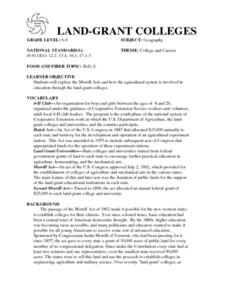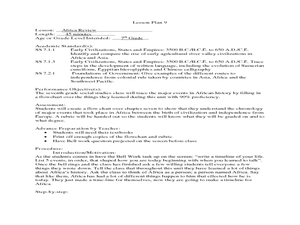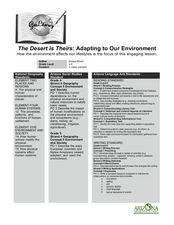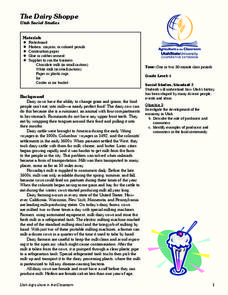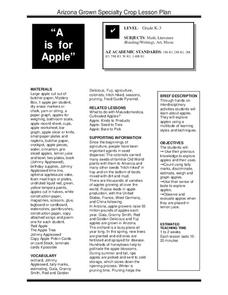Curated OER
Gather the Stones!
Review how gristmills affected the lives of the Pennsylvania community. The class uses documents and pictures to explore the purpose of the gristmill. They simulate members of the community and write a paper about colonial forces...
Curated OER
Why is rice important?
Second graders examine why rice is so important to the world. In this agriculture lesson plan, 2nd graders discover the origins of rice farming. Students study how many countries depend on rice for survival. Students research countries...
Curated OER
Corn An A-Maizing Plant
Fifth graders consider the uses of corn. For this agricultural lesson, 5th graders examine corn as a natural resource and discuss the many ways to reuse the grain. A variety of activities, books, and web resources are...
Curated OER
Barter Day
Fourth graders understand the process of bartering. In this barter day lesson, each student barters an item in their desk with another student. All items are returned at the end of the activity and it is important to tell the students...
Curated OER
LAND-GRANT COLLEGES
Students will explore the Morrill Acts and how the agricultural system is involved in education through the land-grant colleges.1. Have groups find the addresses of the land-grant universities in their assigned states and
write a letter...
Curated OER
At Home on the French Frontier: 1700-1800
Students role play bartering for goods and services as the French settlers did in colonial Illinois. They start with eight household items to acquire through bartering. They have to calculate values for each object and determine the...
Curated OER
IN STRAWBERRY FIELDS
The student will calculate wages of agricultural workers by the hour and by the piece.2. Share background material, and discuss the difference between gross pay and net pay and the difference between getting paid by the hour or the piece...
Curated OER
VS.3e
Third graders explore, examine and identify the importance of the arrival of Africans and women to the Jamestown settlement. They review the groups of people in Virginia during the early 1600s and explain how having a government brought...
Library of Virginia
Antebellum Freedom
From indentured servitude to involuntary race-based servitude, slavery has taken many forms in American history. Class members examine three manumission petitions that reveal how the rights of African Americans and African American...
Curated OER
Centers of the Storm: The Lyceum and the Circle at the University of Mississippi
Greek Revival architecture and the Civil Rights Movement? Sure! Examine how the Lyceum and Circle, two historic buildings located on the campus of the University of Mississippi, relate to integration and the 1962 riot on the university...
Curated OER
What is the history of rice in the United States?
Fifth graders become familiar with the history of rice and create a board game. In this rice lesson, 5th graders understand the history of rice through the playing of a game. Students use vocabulary words related to the...
Curated OER
Human Evolution
Students recognize that achievements of human beings throughout human history can be considered part of the ongoing story of human evolution. They research settings such as the biosphere and Mars and write imaginative short stories using...
Curated OER
Civil War
Historical poetry is lyrical in form and rich with content. After examining the differences between the Northern and Southern states before and during the U.S. Civil War, learners complete a Venn diagram and create an illustration of the...
Curated OER
Kensington Mansion: Plantation, Sharecroppers, Tenants
Eleventh graders investigate the significance of the Kensington Mansion. In this South Carolina history lesson, 11th graders take field trips to the mansion and research primary and secondary sources about plantations, sharecropping, and...
Curated OER
Seventh Grade Social Studies Test
In this Georgia social studies assessment learning exercise, 7th graders respond to 30 multiple choice questions based on 7th grade social studies skills.
Curated OER
Happy Endings: The Final Battle
Fifth graders explore all the myths of the battle of Yorktown. A variety of primary documents are viewed and analyzed for discussion. They become aware that what one sees and hears is not always as it seems in reality. Each group...
Curated OER
Missouri Rice Farming
Sixth graders investigate rice farming in Missouri. In this percentages lesson, 6th graders determine how much rice production has increased over time. Students find this number in percentages. Students then figure the percent of acres...
Curated OER
Africa Review
Seventh graders trace the major events in African history. In this social studies lesson students, create a flowchart depicting the things they learned during this lesson. Students understand the chronology of major events that took...
Curated OER
The Desert is Theirs: Adapting to Our Environment
Students determine how animals and people adapt to the desert environment. In this desert lesson, students review vocabulary about the desert and how humans have to make changes to accommodate their environments. They listen to and...
Curated OER
VA History Mini-quiz - Women and Africans arrive in Jamestown
In this Virginia history worksheet, students examine their knowledge of Jamestown once women and Africans arrived there as they answer 13 multiple choice questions.
Curated OER
Hydroponics
Students discuss the concept of hydroponics. They create and run their own hydroponics system. They record and analyze the data they collect.
Curated OER
Hunters/Gatherers
Young scholars discuss the ways in which an environment is used to provide the basic necessities of life. In groups, they compare and contrast how different hunter and gatherer groups have used the environment to their advantage. They...
Curated OER
The Dairy Shoppe
Fifth graders research dairy farming and learn about dairy products as well as dairy processing. In this dairy lesson, 5th graders read background information about dairy farming and processing. Students discuss running a small business...
Curated OER
A is for Apple
Students participate in a variety of activities to learn about apples. Students graph apples, learn about apple uses, taste apples, and observe what happens when apples are dipped in lemon juice.






